Azerbaijan debacle: The PACE debate on 23 January 2013

Cast of characters
- Jean-Claude Mignon, PACE President (France)
- Pedro Agramunt (Spain)
- Christoph Straesser (Germany)
- Anne Brasseur (Luxembourg)
- Robert Walter (United Kingdom)
- Luca Volonte (Italy)
- Viola von Cramon-Taubadel (Germany)
- Lise Christoffersen (Norway)
- Jean-Marie Bockel (France)
- Marina Schuster (Germany)
- Tadeusz Iwinski (Poland)
- Marietta de Pourbaix-Lundin (Sweden)
- Leonid Slutsky (Russian Federation)
- Samad Seyidov (Azerbaijan)
- Tamas Gaudi Nagy (Hungary)
- Thierry Mariani (France)
- Michael McNamara (Ireland)
- Saban Disli (Turkey)
- Mike Hancock (United Kingdom)
- Agustin Conde (Spain)
- Pasquale Nessa (Italy)
- Theodora Bakoyannis (Greece)
- Ali Huseynli (Azerbaijan)
- Renate Wohlwend (Liechtenstein)
- Terry Leyden (Ireland)
- Giuseppe Valentino (Italy)
- Meritxell Mateu Pi (Andorra)
- Alexander Sidyakin (Russian Federation)
- Christoph Straesser (Germany)
- Joseph Debono Grech (Malta)
- Pedro Agramunt (Spain)
- Renate Wohlwend (Liechtenstein)
- Jean-Claude Mignon, PACE President (France)
- Michael McNamara (Ireland)
- Samad Seyidov (Azerbaijan)
- Jean-Claude Mignon, PACE President (France)
- Christopher Chope (United Kingdom)
- Jean-Claude Mignon, PACE President (France)
- Table: Who voted with Azerbaijan on 23 January?
- Table: Who voted with Christoph Straesser on 23 January?
- Table: Which countries voted with Azerbaijan and which with Straesser on 23 January?
- Table: Committee on Legal Affairs and Human Rights members' votes on political prisoner follow-up
- Table: Committee on Legal Affairs and Human Rights members' votes on political prisoner follow-up, 23 January 2013
On 23 January 2013 a record 224 members of the parliamentary assembly of the Council of Europe (PACE) participated in a debate on Azerbaijan. There have never been more members voting on any resolution in the history of PACE.
The vote was also historic because of its outcome: PACE rapporteur Christoph Straesser's resolution on political prisoners in Azerbaijan was defeated – 125 votes against 79 votes, with 20 abstentions – sending a very strong signal of support to the authoritarian regime in Baku.
Representatives of Azerbaijani president Ilham Aliyev's regime had long waged a campaign against Straesser, who was appointed as rapporteur in March 2009. Most egregiously, Azerbaijan refused to issue Straesser a visa to visit the country on a fact-finding mission, although he applied for it three times. Straesser was openly and repeatedly accused of being part of an anti-Azerbaijani lobbying effort.
The vote on 23 January 2013 was remarkable in terms of who voted with Azerbaijan and who voted with Straesser. All 18 Russian members were present and sided with Azerbaijan. So did 10 Turks, 9 Spaniards, 9 Italians and a majority of members from the United Kingdom (7), Ukraine (7) and France (7).
On the other hand, 11 German members from all political families supported Straesser's resolution. They were joined by all 6 Swedes, and most Swiss, Finns, Norwegians and all Baltic members.
In total, 54 people spoke in the debate. Straesser was accused by his critics of the following things:
- Not visiting Azerbaijan. "Sadly the rapporteur, Mr. Straesser, who is passionate about this issue, has not visited prisons and prisoners in Azerbaijan" (Robert Walter, UK Tory). Walter ignores the fact that Straesser did not get a visa for three years from Azeri authorities.
- Supporting serious criminals. "If the report is approved … those who deal with human organs and those who deal drugs to fund terrorism can all announce themselves to be political prisoners" (Leonid Slutsky, Russia). This is a complete distortion of the very definition of political prisoner presented by Straesser in October 2012 and accepted by PACE, which excludes any justification of terrorism for any political cause.
- Not fact checking. "In the list presented by Mr Straesser, you can find names of people who do not exist" (Samad Seyidov, Azerbaijan). This is a false claim that was never substantiated.
- Rushing the issue. "Time is needed to reach the standards of the Council of Europe" (Tamas Gaudi Nagy from the Hungarian Jobbik Movement). In fact, resolving the issue of political prisoners in Azerbaijan has been on the agenda of PACE since Azerbaijan's accession in 2001.
- Unfairly focusing on Azerbaijan. "We have been obsessed with the political prisoners who might, or might not be, in prison in Azerbaijan, even though the assembly knows that many other countries have political prisoners" (Saban Disli, Turkey AKP). Taken at face value this is an argument in favour of ignoring the issue altogether.
- Empowering terrorists and Islamists. "If you do not want to endorse terrorists and Islamists, vote no to Mr. Straesser's report" (Agustin Conde Bajen, Spanish conservative). Remarkably, all five individual examples Conde refers to in his intervention are people who Straesser's report did NOT consider "presumed political prisoners"!
- Double standards. "Many of the countries represented here have pretty bad human rights records. Let those without sin throw the first stone. Very few of the countries here could throw the first stone" (Terry Leyden, Ireland). An argument suggesting that the situation had become so bad that there was no use any longer of trying to uphold the European Convention of Human Rights.
Another disturbing twist in this debate was the fact that in addition to the vote on Straesser's resolution, a second, concurrent resolution on Azerbaijan had also been put on the table which was presented by its authors as a clear alternative – in contradiction no less – to the resolution drafted by Strasser. As Pedro Agramunt (Spanish, co-rapporteur of the monitoring committee) told PACE:
"I ask members to support the first report, but I will vote against Mr Straesser's report, for obvious reasons: it contradicts our report and encroaches on the authority of the Monitoring Committee."
Agramunt's report, published on 20 December 2012, had called on the Azerbaijani authorities to reconsider the cases of 14 prisoners in Azerbaijan; interestingly, just a few days after his report became public, 13 of these individuals were amnestied by president Aliyev, many having served long periods in prison already. This allowed Agramunt to tell PACE in January 2013:
"Apparently, there is only one left and I have been promised that that individual will be released quickly. I also have a commitment from the government that the nine that were free when I drew up the report will not be put back in prison."
Agramunt then directly challenged Straesser's findings, arguing that
"In all the other cases, other crimes are involved – murder, terrorism, and so on – including cases of former ministers, which were mentioned here, convicted for economic crimes, such as stealing and corruption. Of course, I do not consider these to be political prisoners."
He never explains, however, his methodology in establishing this assessment on his short trips to Baku since 2011 – where he and his colleague met mainly with representatives of the authorities. Not surprisingly, both Russian and Azerbaijani speakers heaped praise on Agramunt's report (see excerpts below). Thierry Mariani from France even noted that Straesser "could not get a visa for Azerbaijan, which is regrettable, but the co-rapporteurs of the Monitoring Committee [i.e.: Agramunt] had no problems" … suggesting that it was in fact Straesser, not the Baku authorities, who were to blame.
Following the debate in PACE a spokesperson for the Azerbaijani government, Ali Hasanov, picked up this exact argument. He argued that Christoph Straesser was an "extremely emotional" person who had deceived and disappointed his followers, and should apologize to the "people of Azerbaijan" or quit politics. He called the vote in PACE a "bitter defeat" for international human rights organisations, all so-called human rights defenders and "grant-eaters" in Azerbaijan itself, stating: "the attempts of various concerned foreign circles to exert pressure on Azerbaijan won't produce any results."[1] Agramunt's report, however, was praised. As Ali Hasanov recommended:
"I would advise Human Rights Watch representatives to thoroughly read the report of co-rapporteurs Pedro Agramunt and Joseph Debono Grech."[2]
This is a remarkable conclusion after a striking debate that is likely to be remembered for many years, and certain to stand as a reminder of just how successfully Azerbaijan has been able to capture and manipulate PACE.
Below are some of the most interesting excerpts from the debate that took place within the PACE hemicycle on 23 January. The full debate is on the website of PACE.[3]
Jean-Claude Mignon, President of the Assembly, takes the Chair at 3.35 p.m.
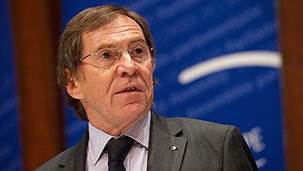
Jean-Claude Mignon (born in 1950) is a member of the French parliament from the Union for a Popular Movement. He was elected PACE President in January 2012 and re-elected for a second term in January 2013.
"The first business this afternoon is a joint debate on the report 'The honouring of obligations and commitments by Azerbaijan' presented by Mr Pedro Agramunt and Mr Joseph Debono Grech on behalf of the Monitoring Committee, Document 13084 and the report 'The follow-up to the issue of political prisoners in Azerbaijan' presented by Mr Christoph Straesser on behalf of the Committee on Legal Affairs and Human Rights, Document 13079 and Addendum."
"We have produced a report that I think is well balanced and to which no one has seriously objected."
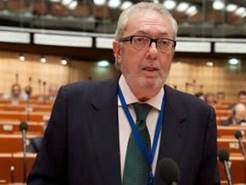
Votes against Straesser's report
Pedro Agramunt (born in 1951), a Spanish senator and businessman from Valencia, has been the Monitoring Committee's co-rapporteur for Azerbaijan since 2010. He traveled to Azerbaijan as a PACE election observer in 2003, 2005 and 2010, and was a member of the PACE mission to the constitutional referendum in Azerbaijan in March 2009.
"The draft report, which was adopted at the December 2012 meeting of the Monitoring Committee in Paris, is the report you now have before you, with one minor amendment that was adopted by the Committee this afternoon.
We have produced a report that I think is well balanced and to which no one has seriously objected. Mr Debono Grech and I are very happy with the report, which is why we would like you strongly to support it. It is the first for some five or six years on the honouring of obligations and commitments by Azerbaijan."
"… Others who are clearly political prisoners are still in prison in Azerbaijan, so we must get to grips with this issue …"
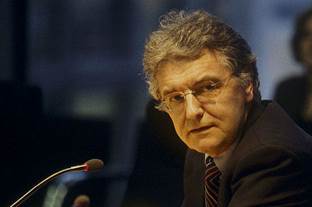
Christoph Straesser (born in 1949) is a German Social Democrat from Muenster. In March 2009, Straesser was appointed rapporteur for political prisoners in Azerbaijan by the PACE Committee on Legal Affairs and Human Rights. In December 2009, the Committee gave him a second mandate – to report on a definition of the term "political prisoner." Throughout his term Azerbaijan refused to issue him a visa for a fact-finding visit. In June 2012, the Committee approved both of Straesser's reports and draft resolutions (on the definition of political prisoner and the follow-up to the issue of political prisoners in Azerbaijan). On 3 October 2012, his draft resolution on the definition of political prisoners was adopted by PACE.
"In 2009, I was appointed rapporteur for following up the issue of political prisoners in Azerbaijan. The task has certainly not been straightforward, but I will not talk about the reasons for that. …
It might be asked why the committee is addressing Azerbaijan alone in this regard, and not other countries, too. I asked that question before working on the topic, but I quickly realised why it is the case. The title of our report is 'the follow-up to the issue of political prisoners in Azerbaijan', which serves to highlight that we have been working over the same ground since 2001 and have produced four texts on the subject.
There is an important political message that we must send. At the time of the last report in 2005, we adopted a resolution. The report stated at paragraph 11: 'In the light of the commitments entered into and the assurances given by the Azerbaijani authorities that the issue would be dealt with to the Assembly's satisfaction by the autumn 2004 session, the Assembly cannot consider the issue of political prisoners to have been finally resolved'.
We in the Parliamentary Assembly must take our own commitments seriously. We have committed ourselves to follow up the process, so we have a responsibility to do so.
Only a few months ago, we agreed on a definition of 'political prisoner'. We do not want to pillory any country in particular, and that definition applies to all 47 member states of the Council of Europe. …
What is the current situation? Unfortunately, on the basis of information gained via co-operation with a number of Azerbaijani non-governmental organisations, it is clear that this issue has not been addressed since our last report.
Only a few weeks ago, there was a presidential amnesty for more than 40 detainees, 14 of whom appeared on the list I submitted, but others who are clearly political prisoners are still in prison in Azerbaijan, so we must get to grips with this issue yet again. …
I hope we will then finally be able to conclude that the issue of political prisoners in Azerbaijan, and in other member states, has finally been resolved. That is our hope, and we all have a responsibility to help to achieve it. I hope we will have a constructive discussion and arrive at a positive result. I appeal to members to vote in favour of the report."
"We must make it clear that much remains to be done. It is unacceptable for a rapporteur to be prevented from entering the country."

Votes for Straesser's report
Anne Brasseur (born in 1950), Luxembourg's former minister of education, is president of the Alliance of Liberals and Democrats in Europe (ALDE), a political group in PACE.
"We have received information that many of the political prisoners on the list have been freed. We welcome that, of course, but others remain behind bars, and further names need to be added to the list, so we need to continue to follow-up this issue. People must not be subjected to discrimination and thrown into prison merely for their political opinions.
Over the period in which the reports [Definition of Political Prisoner, Political Prisoner Follow Up, and the Honouring of Azerbaijan's Obligations] were being written, there was considerable political tension. Visas were refused to members of our Organisation who wanted to visit Azerbaijan to do this work, and they were accused of being anti-Azerbaijan. That is unacceptable; it is more than regrettable…
We must make it clear that much remains to be done. It is unacceptable for a rapporteur to be prevented from entering the country."
"Sadly, the rapporteur … passed judgment on the conclusions of his report before ever attempting to go to Azerbaijan. He based his report on blogs, non-governmental organisation reports and hearsay."
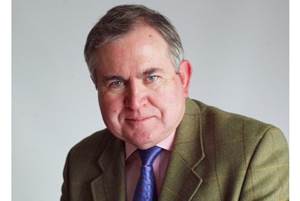
Votes against Straesser's report
Robert Walter (born in 1948), a British Conservative from North Dorset, a rural region in southwest England, is head of the UK delegation to PACE and President of the European Democrat Group in PACE (both since 2011). Walter repeatedly traveled to Azerbaijan as a member of PACE election observation missions (in 2005, 2006, 2008, and 2010). He has been active in developing business ties between the two countries.
"After a series of coups, Azerbaijan has enjoyed probably no more than 20 years of what resembles democracy. It is therefore a young democracy …
The Monitoring Committee's excellent report asks serious questions about elections, the separation of powers, corruption, freedom of expression, freedom of assembly and freedom of association. It also asks questions about political prisoners.
According to the report, which cites Amnesty International's figures, today there are eight political prisoners in Azerbaijan. That is eight too many. It is totally unacceptable to have political prisoners in any member state of the Council of Europe. To the credit of the Monitoring Committee's two rapporteurs, they and OSCE engaged with the Ministry of Justice in Azerbaijan and visited prisons and prisoners in Azerbaijan.
Sadly, the rapporteur for the Committee on Legal Affairs and Human Rights, Mr Straesser, who is passionate about this issue, has not done so. Unfortunately, he passed judgment on the conclusions of his report before ever attempting to go to Azerbaijan. He based his report on blogs, non-governmental organisation reports and hearsay. I believe that, unfortunately, our Monitoring Committee's report now discredits his somewhat confused report and its addendum.
The European Democrat Group spent considerable time looking at both reports. Even with our Azeri and Armenian colleagues present, we decided that we would support wholeheartedly the Monitoring Committee's report, but I am afraid that we decided that we would reject Mr Straesser's report on behalf of the Committee on Legal Affairs and Human Rights."
"Some of our members were in favour of the report, while others, including me, were against, but no one called into question the reality of political prisoners."
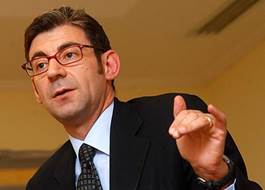
Votes against Straesser's report
Luca Volonte (born in 1966), an MP from the Christian democratic "Union of the Centre" party from Lombardy, is Chairman of the Group of the European People's Party, the largest political group in PACE.
"On the Monitoring Committee's report, our rapporteurs have done excellent work and we congratulate them on that.
As they say, progress has been made but there are growing concerns in a number of regards, such as the independence of the judiciary and the rights of association and assembly. We have also seen measures to curb press freedoms. There are political prisoners and people are deprived of their freedom for reasons of conscience. There are cases of torture and abuse on the part of law enforcement agents …
As I said, our members have a free vote on the second report, on political prisoners; there is no whip. Some of our members were in favour of the report, while others, including me, were against, but no one called into question the reality of political prisoners."
"A revolving door policy is being used. It is a cat-and-mouse game, in which they are arrested, released and then re-arrested shortly afterwards."
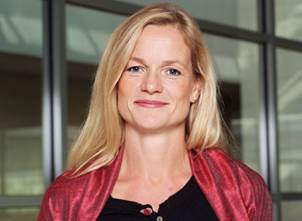
Votes for Straesser's report
Viola von Cramon-Taubadel (born in 1970), a member of the German Green Party, sits on the PACE Monitoring Committee. Von Cramon-Taubadel is known for her active involvement in the South Caucasus region. She has been an outspoken critic of human rights violations in Azerbaijan.
"Mr Straesser has done no more and no less than what he was requested to do regarding the criteria for political prisoners, which he applied to Azerbaijan in October. Unfortunately, many of the problems have not been solved, which is why the Assembly is obliged to work on behalf of the people in that situation …
The problem of political imprisonment in Azerbaijan has still not been solved, even following the amnesty of 26 December. Fourteen people on the list have indeed been released, as were 21 people between June and December 2012, but the problem is that those releases are still pending. Some of those people were released only because they had served their entire sentence, and some are on parole, while, unfortunately, an opposition politician died in prison in August.
The addendum on new cases shows that a revolving door policy is being used as a tactic to silence independent journalists. It is a cat-and-mouse game, in which they are arrested, released and then re-arrested shortly afterwards. Everybody clearly knows that next time it could be them, which is a tactic of intimidation.
As an Assembly, we are the watchdogs of human rights in the Council of Europe. We have the right and the duty to point out violations of human rights."
"From May 2014, Azerbaijan will chair the Committee of Ministers. In my opinion, that severely threatens the credibility of this Organisation."
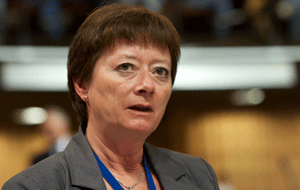
Votes for Straesser's report
Lise Christoffersen (born in 1955) is a member of the Norwegian Parliament representing the Labour Party. In PACE, she serves as First Vice Chairperson of the Monitoring Committee.
"Yesterday, our Secretary General spoke about member states that have problems fulfilling their obligations on human rights, democracy and rule of law. Some of them are willing to work on their problems, but some are not. For the latter, he prescribed harder pressure from this Organisation.
What kind of member state is Azerbaijan?
Let me quote one phrase from each of the two reports: 'growing concern with regard to the rule of law and respect for human rights', and 'The issue of political prisoners is still not resolved'. I could give more statements from the reports about limitations on freedom of expression and of assembly, the lack of access to public media, the fact that there is no separation of powers, fabricated charges against human rights activists and journalists, unfair trials, the systematic detention of political prisoners and prisoners of conscience, the pressure on defence lawyers, corruption and organised crime, torture and ill treatment, impunity for abusers and uninvestigated murders …
From May 2014, Azerbaijan will chair the Committee of Ministers. In my opinion, that severely threatens the credibility of this Organisation. On the other hand, the Azerbaijani authorities really ought carefully to think through whether they will be able to bear scrutiny in that situation."
"I shall vote unreservedly for the first report, but that is not compatible with voting in favour of the other report, which is incomplete and partial."
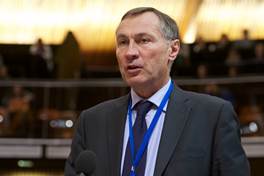
Votes against Straesser's report
Jean-Marie Bockel (born in 1950) first joined PACE in 1999 – 2002, and again in 2004 – 2007, both times as a substitute. He returned in 2012 as a full representative and a member of PACE's European People's Party. He sits on the Committee for Political Affairs and Democracy. After his second assignment to PACE in 2007, he was appointed France's Secretary of State for Defence and Veterans in 2008, and later Secretary of State for Justice and Freedom. He is a founding member of France's Modern Left party.
"I will not give into the temptation to draw too black a picture of the country, because I am sure that it will move closer to the democratic ideal in years to come. The country's economic potential will promote aspirations towards democracy and be a driver of political change … Looking back over the past 10 years, there has been significant progress, with the population benefiting from greater prosperity, which can only foster the emergence of democracy …
We should not stigmatise the country but welcome its efforts. We should not forget Azerbaijan's specific geopolitical position. Although the situation could be improved in many respects, we would do well to look at what is working effectively in there. For example, there is a secular tradition. Although there is a Muslim majority, there is peaceful coexistence of Jewish, Christian and Muslim communities, which we should underscore.
In the light of all those matters, I shall vote unreservedly for the first report, but that is not compatible with voting in favour of the other report, which is incomplete and partial."
"The Assembly should not tolerate our rapporteurs being denied access to a country."

Votes for Straesser's report
Marina Schuster (born in 1975) is a member of the German Bundestag from the liberal Free Democratic Party. As a member of the Bundestag's Commission for Human Rights, Schuster has been actively following the situation with human rights and democracy in Eastern Partnership countries, and in Russia. She joined PACE in 2010, is First Vice Chairperson of the Committee on Legal Affairs and Human Rights, and is a member of the Monitoring Committee.
"The findings of the Monitoring Committee's report give rise to concern. There is a lack of independence of the judiciary, with judges put under pressure. Page 27 details disturbing reports from NGOs of torture. There is a lack of freedom of the media, freedom of expression and freedom of assembly. There are no free and fair elections, and journalists and opposition politicians are intimidated at every turn.
Turning to the second report, people are asking why there is a report on the situation of political prisoners in Azerbaijan, but not about the situation of political prisoners in other countries. The reason is simple: the Assembly decided to commission Mr Straesser to produce a report on the situation of political prisoners in Azerbaijan …
Unfortunately, Mr Straesser could not even visit Azerbaijan. The Assembly should not tolerate our rapporteurs being denied access to a country, as it is essential to be able to see the situation on the ground.
The reports complement each other, and we should adopt both draft resolutions, which concern our core job in the Council of Europe."
"I am convinced that Azerbaijan will continue to meet its commitments and obligations."

Votes against Straesser's report
Tadeusz Iwinski (born in 1944), a former Polish communist, is currently a member of the Polish Sejm representing the Democratic Left Alliance. He has been a member of PACE since 1992, where he sits on the Monitoring Committee and is one of the Vice Chairpersons of the Socialist Group. Iwinski has traveled to Azerbaijan on numerous occasions. In January 2011, Iwinski presented a report on the 2010 Azerbaijani parliamentary elections to the Assembly which was significantly less critical of the elections than the findings of the OSCE/ODIHR observers.
"Since its accession to the Council of Europe 12 years ago, the most populous South Caucasian country has undergone important changes …
Azerbaijan has achieved a lot in the fields of education, the economy, social welfare and in fighting poverty and terrorism. On the other hand, there are still many shortcomings and deficiencies, including in the functioning of a pluralist democracy and a multi-party system and in the freedoms of expression, assembly and association. In Document 13084, all those issues are presented in a holistic and balanced manner …
I am convinced that Azerbaijan will continue to meet its commitments and obligations. I hope that the presidential elections in the autumn will be credible and will contribute to further co-operation with our Organisation."
"Azerbaijan is still a state under authoritarian rule …"
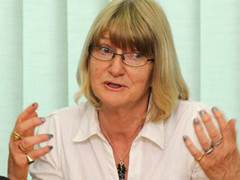
Votes for Straesser's report
Marietta de Pourbaix-Lundin (born in 1951) has been a member of the Swedish Parliament from the Moderate Party since 1995. She joined PACE in 2007 and currently heads the Swedish delegation to PACE. She is a member of the Committee on Legal Affairs and Human Rights, as well as of the Monitoring Committee. She served as a PACE election observer during the November 2010 parliamentary elections in Azerbaijan. Recently, she has led efforts to introduce tighter regulations of conflicts of interests for PACE election observers.
"Corruption; torture; no independent judiciary; impunity; political prisoners; restriction of the freedoms of assembly, association and expression; no respect for human rights, democracy or the rule of law; no separation of power – I could go on. The list is very long. Azerbaijan is still a state under authoritarian rule …
I hope that the two reports will also make a difference for the citizens of Azerbaijan, but I have my doubts. Those in power seem to lack the political will to comply with the obligations and commitments that they signed when they entered the Council of Europe."
"Mr Aliyev was our colleague, as head of the Azerbaijan delegation here. After learning the lessons of the Council of Europe, he is now in charge of Azerbaijan, leading it inexorably towards democracy."
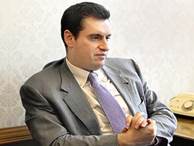
Votes against Straesser's report
Leonid Slutsky (born in 1968) is a Russian MP from the nationalist "Liberal Democratic Party" led by Vladimir Zhirinovsky. He has been a member of PACE since 2004. In 2009, he was awarded an "Order of Friendship" by Ilham Aliyev. From 2005 until 2009, Slutsky served as a Monitoring Committee co-rapporteur on Monaco together with Pedro Agramunt. In April 2006, Slutsky organized a North Pole expedition for Monaco's prince Albert II, one of the world's wealthiest monarchs; in April 2007, he received Monaco's national award called the Order of Grimaldi.[4] These incidents were criticized in PACE and led the Assembly to introduce stricter rules in the code of conduct for rapporteurs.[5]
"I ask you to support the report of Mr Agramunt and Mr Debono Grech on the monitoring of Azerbaijan. There has been much criticism of Azerbaijan, but just as in sport, we should compare Azerbaijan today with Azerbaijan 10 years ago. Then, Mr Aliyev was our colleague, as head of the Azerbaijan delegation here. After learning the lessons of the Council of Europe, he is now in charge of Azerbaijan, leading it inexorably towards democracy.
Human rights are upheld in Azerbaijan … On the other report that we are discussing, I support Mr Straesser and have all due respect for him, but unfortunately, like many in my political group, I cannot support his report. For instance, the definition of a political prisoner that we are offered is very vague and approximate. We must consider how things stand for political prisoners throughout the Council of Europe area. We must see what the European Court of Human Rights says, because it is one of the most authoritative bodies in international law in Europe. Why can we not ask the Court to give us a definition of a political prisoner? …
If the report is approved, then Mr Breivik, those who deal in human organs and those who deal drugs to fund terrorism can all announce themselves to be political prisoners. Criminal elements declaring themselves political prisoners has happened in the Council of Europe, because there is no clear definition."
"The Council of Europe was created for countries, not against them."
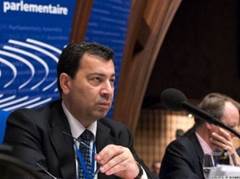
Votes against Straesser's report
Samad Seyidov (born in 1964) is a member of the ruling New Azerbaijan Party. He has been a member of PACE since 2001 and currently heads the Azerbaijani delegation to the Assembly. He is also a member of the PACE Monitoring Committee.
"The Council of Europe was created for countries, not against them. How can we vote for Mr Straesser's report if we can see in it facts that are, if I may say so, strange?
In the list presented by Mr Straesser you can find the names of people who do not exist. Forty people have already been released, and 10 are subject to the procedures of the Court … Our only option is to vote in favour of the Monitoring Committee report, but not in favour of the report presented by Mr Straesser. I hope that we will find the courage to understand that the credibility of our values, not our Organisation, is the most important thing.
In Mr Straesser's report you can find the credibility of the Organisation, but I am thinking about the values of the family of Europe."
"Do not forget that enough time is needed during all these stages to be able to follow the prescriptions of the Council of Europe."
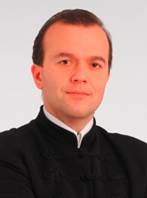
Votes against Straesser's report
Mr. Gaudi Nagy (born in 1971) is a member of Hungary's nationalist Jobbik Movement for a better Hungary. He has been a PACE member since 2010, where he has served on the Committee on Legal Affairs and Human Rights. By training, he is a lawyer, having earned his degree from Eovtos Lorand University in 1995.
"As a human rights lawyer, I feel that it is important to be precise in this field. If we are to charge any member state on this issue, such reports and allegations should be well established…
There are some fields where Azerbaijan has to improve, of course, to reach the standards of the Council of Europe. But do not forget that time enough is needed during all these stages to be able to follow the prescriptions of the Council of Europe. A great number of states are not able to produce the maximum standards that are prescribed by the Council of Europe, which is not good, of course.
On the other report, the data produced by Mr Straesser have been heavily debated. It would be good to review all the data relating to political prisoners, and when a report highlights this problem they should be indisputably established. That is why this second report should not be adopted."
"It has been said that the rapporteur could not get a visa for Azerbaijan, which is regrettable, but the co-rapporteurs of the Monitoring Committee had no problems."
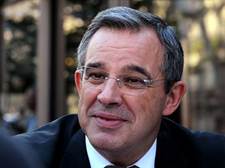
Votes against Straesser's report
Thierry Mariani (born in1958) is one of the co-founders of the political movement "The Popular Right" within the UMP party in France and a former French minister for transport. He joined PACE in October 2012. Mariani is currently a deputy representing the 11th constituency of French citizens abroad (those who reside in Asia, Eastern Europe and Oceania). He is Chairman of the NGO "L'Eurasie – les nouveaux horizons," a small organization that in 2010 co-organized an event with an NGO led by Elkhan Suleymanov (who lead the campaign against Straesser in PACE) on the upcoming parliamentary elections in Azerbaijan. Mariani's NGO is one of the founding members of the "European Academy for Election Observation," a group which issued a positive assessment of the 2010 parliamentary elections in Azerbaijan. Mariani himelf was an OSCE Parliamentary Assembly observer at those elections. Mariani has repeatedly spoken alongside Mehriban Aliyeva, Azerbaijan's First Lady, at several Azerbaijani-organized events in France.
"We are discussing two reports on Azerbaijan that are markedly different. Our colleagues from the Monitoring Committee have done a balanced job. While recording the problems that persist, they have honestly highlighted progress that has been achieved since Azerbaijan's independence. Mr Straesser chose a different path. He allows no credit for the clear progress that has been achieved by this country …
Mr Straesser's report lacks precision. I know that an extra list was added yesterday, and that brings the list up to date as of December, which is welcome in respect of figures that are difficult to accept. There are too many divergences, still, between these figures and those of Amnesty International, which are mentioned in the Monitoring Committee's report, and those from Azerbaijani NGOs. He says that the Islamic Party of Azerbaijan provided acceptable replies, but is this not a little naïve? …
It has been said that the rapporteur could not get a visa for Azerbaijan, which is regrettable, but the co-rapporteurs of the Monitoring Committee had no problems. In fact, they stressed the high quality of their contacts and of the responses from the Azerbaijani authorities. They even visited prisoners …
I support the draft resolution, but will vote against Mr Straesser's report."
"Mr Straesser's report…goes into great detail about the definition of a political prisoner and the methodology of his report, …which nobody has taken issue."
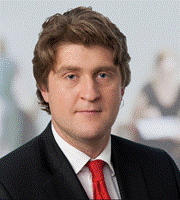
Votes for Straesser's report
Mr. McNamara (born in 1974) first served in PACE as a substitute for 2011, but was assigned as a full representative in 2012. He is a member of the Committee on Legal Affairs and Human Rights, and Chairman of the Sub-Committee on Human Rights. He is a member of Ireland's Labour Party.
"Previous speakers expressed the fear that, as a result of Mr Straesser's report, terrorists could claim to be political prisoners, but a close reading of the report would do a lot to dispel that fear. He makes it clear that the definition of a political prisoner adopted for the report is based on the definition and criteria used by the three independent experts appointed by the Committee of Ministers on 31 January 2001 …
I particularly draw members' attention to paragraph 2.5 of Mr Straesser's report, where he goes into great detail about the definition of a political prisoner and the methodology of his report, with which nobody has taken issue, notwithstanding the criticisms. He points out that an 'allegation that a person is a 'political prisoner' must be supported by prime facie evidence; it is then for the detaining State to prove that the detention is in full conformity with requirements of the Convention as interpreted by the European Court of Human Rights in so far as the merits are concerned, that the requirements of proportionality and non-discrimination have been respected and that the deprivation of liberty is the result of fair proceedings.' In the great majority of cases, the detaining state would be able to meet those criteria."
"This issue has been on the Assembly's agenda since 2001, which is a clear sign that our policy is not working and only leading to fruitless political debate."
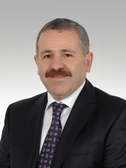
Votes against Straesser's report
Mr. Disli (born in 1958) is a member of Turkey's Justice and Development Party, and has served as a member of its PACE delegation since 2011. He is a member of the Legal Affairs and Human Rights Committee, and the sub-committee on Media and Information Society.
"Today, we are again debating political prisoners in Azerbaijan. Unfortunately, we have been obsessed with the political prisoners who might, or might not be, in prison in Azerbaijan, even though the Assembly knows that many other countries have political prisoners. This issue has been on the Assembly's agenda since 2001, which is a clear sign that our policy is not working and only leading to fruitless political debate."
"If we vote for Mr Straesser's report – goodness me, I hope we do not – we cannot stop there. This report will need to be duplicated time after time."
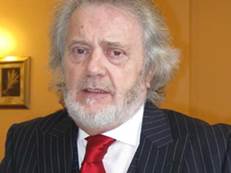
Votes against Straesser's report
Michael Hancock (born in 1946) is a British Liberal Democrat. He has been a member of PACE since 1997 and sits on the Monitoring Committee. Hancock served as a PACE election observer in Azerbaijan in 2008 and 2010, praising the conduct of the votes both times. Hancock has consistently supported Azerbaijan in parliamentary debates. In January 2011, he signed a statement praising Azerbaijan's "speedy improvement towards democratisation and legal state-building." Hancock is one of the Vice Chairs of the Azerbaijan All-Party Parliamentary Group in the UK.
"If we are not careful, we risk setting an undesirable precedent. To have a monitoring report on a country and then to take out of it a specific topic and make it the subject of a separate report, as we see today, raises the question: is this the norm? Will all those countries listed on Human Rights Watch's website – including Albania, Armenia, Belgium, Bosnia, Bulgaria, Croatia, Georgia, Greece, Hungary, Serbia, Turkey, Ukraine and the United Kingdom, all of which are members here – be subjected to the same scrutiny from a distance and through non-governmental organisations and websites? That is what Mr Straesser has done…
What can we do today? The Monitoring Committee report is much harder hitting than many monitoring reports on other countries. It pulls no punches and goes into detail on many issues, far in excess of what we have done in other countries. Today, we risk putting Azerbaijan in double jeopardy. If we vote for Mr Straesser's report – goodness me, I hope we do not – we cannot stop there. This report will need to be duplicated time after time, and quickly, because otherwise Azerbaijan and the next country will feel, rightly, that they are being in some way targeted. That cannot be fair, it cannot be right and it should not be tolerated in the Assembly."
"If you do not want to endorse terrorists and Islamists, vote no to Mr Straesser's report."
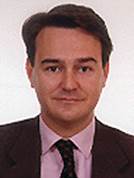
Votes against Straesser's report
Mr. Conde (born in 1965) from the Spanish conservative Popular Party has been a member of PACE since 2009 where he is the third vice-chair of the Committee on Legal Affairs and Human Rights. In the 1990s he was the youngest ever mayor of Toledo.
"With all due respect to our colleague, Mr Straesser's list includes several men who can in no way be considered political prisoners, and the experts excluded them on that account.
Case Nos. 71 and 73 in the report were both, in the words of the rapporteur in paragraph 178, 'convicted of violent, "non-political" crimes, including the premeditated murder of a prosecutor.' Similarly, the men in Case Nos. 66, 79 and 85 were convicted for participation in a violent, premeditated murder, and the experts also deny them the status of political prisoners.[6] A killer – a murderer – is not, and should never be considered, a political prisoner. According to the resolution by the Assembly last October, a terrorist is not a political prisoner, and for that reason, I cannot support Mr Straesser's report …
If you want to send a serious warning to Azerbaijan about the respect of human rights, vote for the report of Mr Agramunt and Mr Debono Grech. If you do not want to endorse terrorists and Islamists, vote no to Mr Straesser's report."
"Does Mr Straesser not think it is dangerous to encourage the spread of fundamentalism in what is a complex region?"
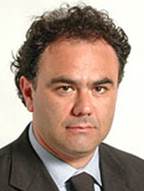
Votes against Straesser's report
Mr. Pasquale Nessa (born in 1960), first joined PACE as a substitute from 2001 – 2008. Later in 2008, he returned as a full member. He has been a member of the European People's Party since 2001, and currently sits on the Committee for the Honouring of Obligations and Commitments by member states. Within Italy, he is a member of the People of Freedom Party.
"I congratulate the rapporteurs and support the Monitoring Committee's report, but I have reservations about Mr Straesser's report and his proposals … Does Mr Straesser know that Article 17 of the European Convention on Human Rights says that every state has the right to defend its own constitutional order against groups that wish to overthrow it?
Mr Straesser considers members of radical Islamic groups who have been sentenced for mounting a coup to be political prisoners, and has called for their immediate release. Why?
Mr Samedov, chair of the Islamic party of Azerbaijan, has publicly said he wants to introduce Sharia. Mr Straesser says he is a political prisoner, yet says at paragraph 100 that he and eight other members of his party had been caught in possession of Kalashnikovs, grenades and munitions. Sanctions have been imposed against Iran, a country that neighbours Azerbaijan. Does Mr Straesser not think it is dangerous to encourage the spread of fundamentalism in what is a complex region? …
The Council of Europe's purpose is to uphold democracy and secularism in our member states. I am opposed to the rapporteur's position on this important issue. It addresses a delicate topic in a dangerous way, so I shall vote against the report."
"I am new here and do not really understand why we should have two reports."
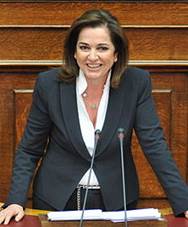
Votes against Straesser's report
Ms. Bakoyannis (born in 1954) was first a member of PACE from 2000 – 2003, before returning for a short period in 2010, and now again in 2012. She is a member of PACE's Committee on Political Affairs and Democracy, as well as the Committee on Honouring of Obligations and Commitments by Member States. Between 2006 – 2009, she served as Greece's Minister of Foreign Affairs, and was co-chairperson-in-office for the Organization for Security and Cooperation in Europe.
"I am new here and do not really understand why we should have two reports. I do not understand why the decision was taken, but now we have two reports. Mr Agramunt and his colleague did a very good job and their report for the Monitoring Committee is well balanced.
Unfortunately, because of the second report, we have not spoken about the essence of the first report. In his report, Mr Agramunt speaks about press freedom, the justice system and everything that has to be improved in Azerbaijan, but we have lost sight of that because we have spoken only about political prisoners.
I am lost. I will take just have a minute to tell you my personal story. I was a political prisoner when I was 14. This was at the time of the Greek dictatorship. I did not plant any bombs, but my father was a politician and, because of him, I was a political prisoner. When I grew up, terrorists killed my husband. A few years later, we saw the murderers. There were three murderers, and about 10 others told them to execute him. The former committed the crime; the latter did not commit the crime, but took the decision, and they are now applying to be named as political prisoners. I am therefore very careful, Mr Straesser, because I know Azerbaijan. Yes, a lot of things have to be done, but it is a country where women can walk around, where there is religious freedom and where its neighbours do not like it to be like that…
I therefore think that we should stick to and vote for the Monitoring Committee's report."
"As a lawyer, I find the use of the term 'political prisoner' vis-à-vis a country that is fully exercising legal instruments absurd and unacceptable."
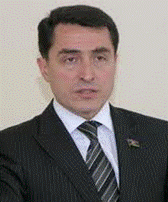
Votes against Straesser's report
Ali Huseynli (born in 1968) is an MP from the ruling New Azerbaijan Party. He has been a member of PACE since 2004.
"I thank the co-rapporteurs for their balanced report, but I want to say a few words about the second report.
As a lawyer, I find the use of the term 'political prisoner' vis-à-vis a country that is fully exercising legal instruments absurd and unacceptable. The serious mistakes and deliberate distortion of facts in the report once more confirm our concerns about the biased approach demonstrated by the rapporteur. I kindly ask Mr Straesser to show the true, unbiased position based on facts. I call colleagues to vote against the second report."
"[The political prisoner] problem has not been solved by [recent] or by earlier amnesties, because a dozen opposition politicians, journalists, bloggers and peaceful demonstrators currently sit in prison."
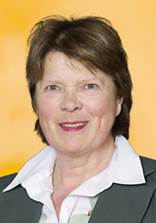
Votes for Straesser's report
Ms. Wohlwend (born in 1952) first served in PACE from 1994 – 1997 as a substitute, becoming a full representative in 1997. She serves on the Committee on Legal Affairs and Human Rights, as well as the Committee on the Honouring of Obligations and Commitments by Member States. In PACE, she is in the European People's Party group. She is a member of Liechenstein's Progressive Citizen's Party.
"In recent days I have heard time and again that the issue of political prisoners in Azerbaijan has been resolved, and that at the end of December the president gave an amnesty to the persons who figure in the report, but in fact the problem has not been solved by that or by earlier amnesties, because a dozen opposition politicians, journalists, bloggers and peaceful demonstrators currently sit in prison…
To intimidate opposition figures, critical journalists and youth activists, the submissive legal system picks on them with varying degrees of severity. They are released, and then shortly afterwards put in prison again. The issue of political prisoners will only be resolved once we put an end to the revolving door policy, as the committee's report rightly says. To that end, it deserves our support.
I am very disappointed that some of my group colleagues have quoted selectively from the report of our colleague Mr Straesser in order to slant the debate."
"Many of the countries represented here have pretty bad human rights records. Let those without sin throw the first stone. Very few of the countries here could throw the first stone."
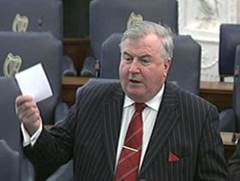
Votes against Straesser's report
Mr. Leyden (born in 1945) has been a member of Ireland's PACE delegation starting in 1992 – 1993, and then as a substitute from 2007 – 2011. In 2011, he joined as a full representative. He is a member of the Committee on the Honouring of Obligations and Commitments by Member States. In PACE he sits with the Alliance of Liberals and Democrats of Europe, and has served as vice-chairman since 1997. In Ireland, he represents Fianna Fail.
"This is one of the most interesting debates that has been held in the Assembly for some time, as the attendance makes obvious.
I commend the Monitoring Committee, of which I am a member, on its report. I fully support the views of Mr Debono Grech and Mr Agramunt on the report, and I commend them on its detailed, comprehensive and far-reaching nature. I am very impressed that our friends from Azerbaijan are prepared to go along with the report without major amendments. It is vital that the Monitoring Committee continue to monitor Azerbaijan and ensure that the report is fully implemented by the Government of Azerbaijan.
I suppose I am one of the few people here who have never been in Azerbaijan, but if I do go there, I intend to meet some of these political prisoners and find out for myself the truth of Mr Straesser's report, which I will be voting against.
In all my time in the Council of Europe, in this century and the last century, I have never come across a parallel report before. The fact that this other report is being debated undermines the strength of the Monitoring Committee's report.
I therefore urge colleagues to vote for, endorse and implement the monitoring report, but to vote down the other report, which is totally inaccurate …
Many of the countries represented here have pretty bad human rights records. Let those without sin throw the first stone. Very few of the countries here could throw the first stone, because many of them have pretty poor records in this regard.
I hope that the vote will go in favour of the report by the Monitoring Committee, of which I am a full member, and that the other report will be rejected."
"There are no facts at hand about the circumstances of the arrests or the motivation of the state, and there are no known violations of the rights of these people who have been subjected to the rigour of the law."
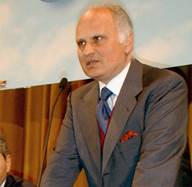
Votes against Straesser's report
Mr. Valentino (born in 1945) has been in Italy's delegation to PACE since 2006, where he sits with the European Democrat Group. He sits on the Committee for Legal Affairs and Human Rights. In Italy, he represents the National Alliance as Senator, and sits on the Senate Judiciary Committee.
"I appreciated the report by the Monitoring Committee, which welcomes the efforts of a young democracy to explore democracy and tighten up its democratic rules. All that is happening in a tense geopolitical context …
The criticisms in the Straesser report are rather unfounded. It does not justify why it is critical and does not analyse the situation … There are no facts at hand about the circumstances of the arrests or the motivation of the state, and there are no known violations of the rights of these people who have been subjected to the rigour of the law.
The Straesser report is emotive but lacks facts and certainties. I am therefore critical of it and will vote against it, whereas I commend the Monitoring Committee report to the Assembly."
"These matters always depend on the power and influence of the country concerned."
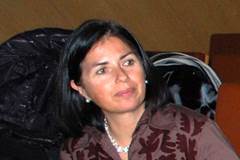
Votes against Straesser's report
Ms. Mateu Pi (born in 1966) has been a member of PACE since 2011, when she is a member of the Alliance of Liberals and Democrats for Europe. She sits on the Committee for Legal Affairs and Human Rights, and on the Committee for Political Affairs and Democracy. She is a member of Andorra's Liberal Party, and has served her country as Minister of Foreign Affairs from 2007 – 2009. She has also held ambassadorships to France, Germany, Demark, Netherlands, and Slovenia.
"It is difficult to understand why we need the second report, given that the Monitoring Committee's report covers political prisoners, alongside other subjects such as society and religion …
To take the kind of overview that Mr Straesser calls for would be to take the view that there may be political prisoners in all of our countries. I do not think that anybody will ever admit to that, because we have a double standard. These matters always depend on the power and influence of the country concerned. It would be wonderful for the citizens of the countries concerned if that changed, but that is not likely.
Therefore, I will support the Monitoring Committee's report, but cannot support Mr Straesser's report."
"If the one person who had gone off for a cup of coffee had come back in time, we would not have had the current definition of political prisoners."

Votes against Straesser's report
Alexander Sidyakin (born in 1977) is a member of the ruling United Russia party. He joined PACE in 2012 and currently sits on the Committee for Legal Affairs and Human Rights. Sidyakin is one of the initiators of the widely criticized law adopted in June 2012 which drastically (over 100-fold) increased financial penalties for participating in unauthorized protests. A similar law was adopted in Azerbaijan in November 2012.
"All members will remember that not long ago, we had an even vote with 89 members for and 89 against [the definition of 'political prisoner.'] If the one person who had gone off for a cup of coffee had come back in time, we would not have had the current definition of political prisoners …
I will give another example. A member of the opposition recently said that his wife had left home and he could not find her. It turned out that he had killed her, dismembered her and put the pieces on the balcony. Many people in the opposition said that that was a political arrest. Does that mean that somebody who supports the government and votes for it cannot be a political prisoner, but an opponent of the government obviously is a political prisoner? …
I support the report of the Monitoring Committee, but do not think that we should support the report on political prisoners."
President of PACE, Jean-Claude Mignon, noting that everyone on the list of speakers had a chance to take the floor, gives the word to the rapporteurs to react to the debate.
"What is important is not what I think, or what you think, but the people who are in prison who are not being released."
"I thank you all for this discussion, which marks the end of a very long process. I am pleased that we have had a constructive debate, but some of the contributions and assessments were far removed from my remit.
I ask the many speakers who criticised how I dealt with Azerbaijan where the report came from. It came from the fact that this Parliamentary Assembly can trust me with that remit. I simply tried to carry it out, and I still feel strongly about it …
A topic is being opened up that has already been settled within this Assembly: the topic of defining political prisoners in the context of the European Convention on Human Rights …
Turning to the procedure to be followed, my experience is that there has been co-operation within the Parliamentary Assembly and the Council of Europe. In 2010 I was given the remit to carry out a fact-finding mission in Azerbaijan. I should have been invited to the country, and when, in mid-2011, I was still waiting for an invitation I contacted the Azerbaijani embassy in Germany to get a visa, but the request was turned down on the ground that there was no need for a discussion on political prisoners in Azerbaijan.
I say that to explain to you clearly that we are hearing some strange arguments and accusations. I was prevented from travelling to that country, and some people's arguments are far removed from the actual situation …
Colleagues such as Mr Hancock have said that Amnesty International says that everything is okay regarding prisoners of conscience. Well, that is not true. Colleagues should look at the memorandum that has been signed by a plethora of human rights organisations.
I understand what our colleague was saying about terrorism, but I would like you to look at the exact drafting of the report, where the different points that you made are clearly characterised. There are prisoners whom I do not consider political prisoners. You have said exactly the opposite of what is in my report, and I do not think that we can accept that in this Chamber.
You mentioned Sharia and Islamism. I would like you to read my report again. No one in this Chamber will say that someone who uses violence or introduces Sharia Law could be considered a political prisoner.
There is another side to the story – the rule of law. Even someone accused of terrorism is entitled to the rule of law, due process and full compliance with human rights. That what we in the Parliamentary Assembly are here to tackle. I have done no more and no less than to point that out in the report …
I want finally to make some important personal remarks … We need to give thought to what will happen as a result of our decisions. If it is a positive result, we feel a sense of triumph; if it is negative, we are dismayed or downcast. After a process lasting a few years, one wants a positive result, but I will not feel any sense of triumph if that is the case. I want us, in the near future, to have no more discussion on this matter in Azerbaijan.
There should not be feelings of triumph or disappointment in the Chamber. What is important is not what I think, or what you think, but the people who are in prison who are not being released.
Let me say three names that we talk about: Yulia Tymoshenko, Khodorkovsky and Pussy Riot. It is a very good thing that we talk about them, and it is important, but please let us talk about people who are languishing in prison whose names are not known. My list is a reflection of that situation, and I would like you to take that on board."
"These people need our help. Even the government needs our help. However, we have to keep in mind that they have come a long way."
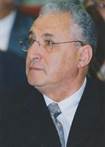
Votes against Straesser's report
Joseph Debono Grech (born in 1939) is a member of Malta's Labour Party. He joined PACE in 1999. Debono Grech is currently a member of the Monitoring Committee. In 2009, he was appointed the committee's co-rapporteur for Azerbaijan, competing against Lise Christoffersen (Norway). Debono Grech also was a PACE election observer in Azerbaijan in November 2010.
"The Council of Europe has come a long way since it was founded. I have been a member of parliament for the last 40 years. I was thrown in prison by the British Government when we were fighting for independence, so I know what a political prisoner really is. What we have done is not entirely my work or Mr Agramunt's. The work was started years ago in Azerbaijan …
The Council of Europe has achieved a lot, through what its rapporteurs have done, including those before me and Mr Agramunt.
There are still prisoners of conscience or political prisoners. This cannot be dealt with by doing this or doing that and by criticising everybody. We must have dialogue, and not only with Azerbaijan …
Our job is to help these people – to help the new democracies. These people need our help. Even the government needs our help. However, we have to keep in mind that they have come a long way.
We still have a long way to go, but with everybody's help – the Council of Europe and all its members – between us, in co-operation with the Committee of Ministers and the President of the Republic of Azerbaijan, we will find that the time will come when Azerbaijan will be a real democracy."
"I ask members to support the first report, but I will vote against Mr Straesser's report, for obvious reasons: it contradicts our report and encroaches on the authority of the Monitoring Committee."
"Azerbaijan is not a perfect democracy. As many people have said here, it has a long way to go. The report mentions a number of issues that we have not been able to analyse in depth, but we do mention what needs to be done.
We must also recognise that, over these 20 years, Azerbaijan has made a lot of progress. We cannot just look at the negative. Certainly, it is not in a worse situation than other countries that are members of the Council of Europe, especially remembering that it is in a complex geographical situation, as was mentioned. I want to stress this …
On political prisoners, for obvious reasons – it contradicts what we say in our report about political prisoners – I regret that I cannot support Mr Straesser's report.
We established that there are 14 people in prisons and nine that had already been released when the report was drawn up. That figure is more than was defined by Amnesty. Apparently, there is only one left and I have been promised that that individual will be released quickly. I also have a commitment from the government that the nine that were free when I drew up the report will not be put back in prison.
These are cases that I have checked, which could be prisoners of conscience. In all the other cases, other crimes are involved – murder, terrorism, and so on – including cases of former ministers, which were mentioned here, convicted for economic crimes, such as stealing and corruption. Of course, I do not consider these to be political prisoners … Why do we speak only of political prisoners in Azerbaijan, not in Russia, Armenia and other countries that have them?
I ask members to support the first report, but I will vote against Mr Straesser's report, for obvious reasons: it contradicts our report and encroaches on the authority of the Monitoring Committee."
"This is the first time I have known a rapporteur to disagree with a report by a colleague."
"I have been a member for almost 20 years, and this is the first time I have known a rapporteur to disagree with a report by a colleague. I am sorry, but this is impossible."
PACE President Mignon closes the debate and calls speakers on five tabled amendments to the draft resolution.
"We come to Amendment 1, tabled by Mr Michael McNamara, Lord John E. Tomlinson, Mr Jean-Pierre Michel, Mr Stefan Schennach, Mr Björn von Sydow, which is to, in the draft resolution, after paragraph 3, insert the following paragraph:
'It regrets that the Azerbaijani authorities prevented the Rapporteur from carrying out a fact-finding visit to Azerbaidjan, which had been duly authorised by the Committee on Legal Affairs and Human Rights.'"
"Are we, as an Assembly, about to ask our rapporteurs to do a job and then remain silent when obstacles are put in their way that prevent them from carrying out that task? Is that really the value that we, as an Assembly, place on our own work and that which we task others to do? I hope not, and I ask you to support the amendment."
"Azerbaijan never said that we were not ready to accept, but previously the rapporteur, a priori, criticised Azerbaijan. That is why I am against the amendment completely."
"What is the opinion of the committee?"
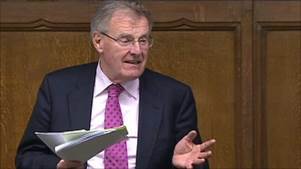
Mr. Chope (born in 1947) has been a member in PACE since 2005, serving as the treasurer for the European Democrat Group. He is the Chairperson of the Legal Affairs and Human Rights Committee. Chope was elected in 1997 as Member of Parliament for the Christchuch Conservatives. Within the British parliament, he serves on the Panel of Chairs.
"The committee is in favour."
"The vote is open."
Amendment 1 is adopted. Four other amendments are rejected.
"We will now proceed to vote on the whole of the draft resolution contained in Document 13079, as amended."
79 votes for
125 against
20 abstentions.
The draft resolution
"Follow up to the issue of political prisoners in Azerbaijan"
is rejected.
(Total: 125)
|
Member |
Country |
Political Group |
|
Mr Tamerlan AGUZAROV |
Russia |
EDG |
|
Mr Alexey Ivanovich ALEKSANDROV |
Russia |
EDG |
|
Mr Otari ARSHBA |
Russia |
EDG |
|
Mr Anton BELYAKOV |
Russia |
UEL |
|
Ms Olga BORZOVA |
Russia |
EDG |
|
Ms Natalia BURYKINA |
Russia |
EDG |
|
Mr Vyacheslav FETISOV |
Russia |
EDG |
|
Ms Olga KAZAKOVA |
Russia |
EDG |
|
Mr Dmitry KRYVITSKY |
Russia |
EDG |
|
Mr Anvar MAKHMUTOV |
Russia |
EDG |
|
Mr Alexey PUSHKOV |
Russia |
EDG |
|
Mr Yury SHAMKOV |
Russia |
EDG |
|
Mr Robert SHLEGEL |
Russia |
EDG |
|
Mr Alexander SIDYAKIN |
Russia |
EDG |
|
Mr Leonid SLUTSKY |
Russia |
SOC |
|
Mr Yury SOLONIN |
Russia |
EDG |
|
Mr Valeriy SUDARENKOV |
Russia |
SOC |
|
Mr Alexander TER-AVANESOV |
Russia (18) |
EDG |
|
Mr Deniz BAYKAL |
Turkey |
SOC |
|
Mme Gülsün BILGEHAN |
Turkey |
SOC |
|
Mr Mevlüt ÇAVUSOGLU |
Turkey |
EDG |
|
Mr Saban DISLI |
Turkey |
EPP/CD |
|
Mme Tülin ERKAL KARA |
Turkey |
EPP/CD |
|
Ms Pelin GÜNDES BAKIR |
Turkey |
EDG |
|
M. Burhan KAYATÜRK |
Turkey |
EPP/CD |
|
Mr Haluk KOÇ |
Turkey |
SOC |
|
Ms Nursuna MEMECAN |
Turkey |
ALDE |
|
Mr Ahmet Kutalmis TÜRKES |
Turkey (10) |
EDG |
|
M. Pedro AGRAMUNT |
Spain |
EPP/CD |
|
M. José María BENEYTO |
Spain |
EPP/CD |
|
Mr Agustín CONDE |
Spain |
EPP/CD |
|
Mr Rubén MORENO PALANQUES |
Spain |
EPP/CD |
|
Mr Alejandro MUÑOZ-ALONSO |
Spain |
EPP/CD |
|
Mme Eva PARERA |
Spain |
EPP/CD |
|
M. Gabino PUCHE |
Spain |
EPP/CD |
|
Mme Carmen QUINTANILLA |
Spain |
EPP/CD |
|
Mr Jordi XUCLÀ |
Spain (9) |
ALDE |
|
Ms Rossana BOLDI |
Italy |
EDG |
|
Mr Gennaro MALGIERI |
Italy |
EPP/CD |
|
M. Pasquale NESSA |
Italy |
EPP/CD |
|
Mr Andrea RIGONI |
Italy |
ALDE |
|
Mr Giacomo SANTINI |
Italy |
EPP/CD |
|
Mr Giuseppe SARO |
Italy |
EPP/CD |
|
M. Giacomo STUCCHI |
Italy |
EDG |
|
M. Giuseppe VALENTINO |
Italy |
EDG |
|
Mr Luca VOLONTÈ |
Italy (9) |
EPP/CD |
|
Mr James CLAPPISON |
UK |
EDG |
|
Alexander [The Earl of] DUNDEE |
UK |
EDG |
|
Baroness Diana ECCLES |
UK |
EDG |
|
Ms Cheryl GILLAN |
UK |
EDG |
|
Mr Mike HANCOCK |
UK |
ALDE |
|
Mr Robert NEILL |
UK |
EDG |
|
Mr Robert WALTER |
UK |
EDG |
|
Dame Angela WATKINSON |
UK (8) |
EDG |
|
Mr Serhii KIVALOV |
Ukraine |
EDG |
|
Mr Yevhen MARMAZOV |
Ukraine |
UEL |
|
Ms Larysa MELNYCHUK |
Ukraine |
NR |
|
Mr Lev MYRYMSKYI |
Ukraine |
NR |
|
M. Ivan POPESCU |
Ukraine |
SOC |
|
Mr Volodymyr PYLYPENKO |
Ukraine (6) |
SOC |
|
M. Christian BATAILLE |
France |
SOC |
|
M. Jean-Marie BOCKEL |
France |
EPP/CD |
|
M. Jean-Yves LE DÉAUT |
France |
SOC |
|
M. Thierry MARIANI |
France |
EPP/CD |
|
M. Yves POZZO di BORGO |
France |
EPP/CD |
|
M. André SCHNEIDER |
France |
EPP/CD |
|
Mme Marie-Jo ZIMMERMANN |
France (7) |
EPP/CD |
|
Ms Sevinj FATALIYEVA |
Azerbaijan |
EDG |
|
Ms Sahiba GAFAROVA |
Azerbaijan |
EDG |
|
Mr Ali HUSEYNLI |
Azerbaijan |
EDG |
|
Mr Rafael HUSEYNOV |
Azerbaijan |
ALDE |
|
Mr Rovshan RZAYEV |
Azerbaijan |
EPP/CD |
|
Mr Samad SEYIDOV |
Azerbaijan (6) |
EDG |
|
Ms Katerina KONECNÁ |
Czech Republic |
UEL |
|
Mr Miroslav KREJCA |
Czech Republic |
EPP/CD |
|
Mr Václav KUBATA |
Czech Republic |
EPP/CD |
|
Mr Pavel LEBEDA |
Czech Republic |
SOC |
|
Ms Dana VÁHALOVÁ |
Czech Republic (5) |
SOC |
|
Ms Theodora BAKOYANNIS |
Greece |
EPP/CD |
|
Mr Ioannis DRAGASAKIS |
Greece |
UEL |
|
Ms Liana KANELLI |
Greece |
UEL |
|
Mr Epameinondas MARIAS |
Greece |
NR |
|
Ms Foteini PIPILI |
Greece (5) |
EPP/CD |
|
Mr Grzegorz CZELEJ |
Poland |
NR |
|
Mr Zbigniew GIRZYNSKI |
Poland |
NR |
|
Mr Jaroslaw GÓRCZYNSKI |
Poland |
EPP/CD |
|
Mr Tadeusz IWINSKI |
Poland |
SOC |
|
Mr Lukasz ZBONIKOWSKI |
Poland (5) |
NR |
|
Mr António BRAGA |
Portugal |
SOC |
|
M. Telmo CORREIA |
Portugal |
EDG |
|
Mr Carlos COSTA NEVES |
Portugal |
EPP/CD |
|
Mr José MENDES BOTA |
Portugal (4) |
EPP/CD |
|
Mr Miloš ALIGRUDIC |
Serbia |
EDG |
|
Ms Aleksandra DJUROVIC |
Serbia |
NR |
|
Mr Vladimir ILIC |
Serbia |
NR |
|
Ms Stefana MILADINOVIC |
Serbia (4) |
SOC |
|
Mr Mikuláš DZURINDA |
Slovakia |
EPP/CD |
|
Ms Darina GABÁNIOVÁ |
Slovakia |
SOC |
|
M. Pavol GOGA |
Slovakia |
SOC |
|
Ms Olga NACHTMANNOVÁ |
Slovakia (4) |
SOC |
|
Mr Terence FLANAGAN |
Ireland |
EPP/CD |
|
Mr Terry LEYDEN |
Ireland |
ALDE |
|
Mr Joseph O'REILLY |
Ireland (3) |
EPP/CD |
|
Mme Corina FUSU |
Moldova |
ALDE |
|
Mr Valeriu GHILETCHI |
Moldova |
EPP/CD |
|
Mr Grigore PETRENCO |
Moldova (3) |
UEL |
|
Mme Milica MARKOVIC |
Bosnia and Herzeg. |
SOC |
|
Mr Senad ŠEPIC |
Bosnia and Herzeg. (2) |
EPP/CD |
|
M. Philippe BLANCHART |
Belgium |
SOC |
|
M. Patrick MORIAU |
Belgium (2) |
SOC |
|
Mr Damir ŠEHOVIC |
Montenegro |
SOC |
|
Mr Zoran VUKCEVIC |
Montenegro (2) |
SOC |
|
Ms Ermira MEHMETI DEVAJA |
Macedonia |
SOC |
|
Mr Aleksandar NIKOLOSKI |
Macedonia (2) |
EPP/CD |
|
Mr Viorel Riceard BADEA |
Romania |
EPP/CD |
|
Mr Ionut-Marian STROE |
Romania (2) |
ALDE |
|
Mme Meritxell MATEU PI |
Andorra (1) |
ALDE |
|
M. Younal LOUTFI |
Bulgaria (1) |
ALDE |
|
Mme Doris FIALA |
Switzerland (1) |
ALDE |
|
Ms Sirkka-Liisa ANTTILA |
Finland (1) |
ALDE |
|
Mr Tedo JAPARIDZE |
Georgia (1) |
NR |
|
Mr Tamás GAUDI NAGY |
Hungary (1) |
NR |
|
Mr Joseph DEBONO GRECH |
Malta (1) |
SOC |
|
Ms Karin S. WOLDSETH |
Norway (1) |
EDG |
|
Mme Lorella STEFANELLI |
San Marino (1) |
EPP/CD |
(Total: 79)
|
Member |
Country |
Political Group |
|
Ms Doris BARNETT |
Germany |
SOC |
|
Ms Marieluise BECK |
Germany |
ALDE |
|
Ms Viola von CRAMON-TAUBADEL |
Germany |
SOC |
|
Mr Erich Georg FRITZ |
Germany |
EPP/CD |
|
Mr Joachim HÖRSTER |
Germany |
EPP/CD |
|
Mr Jerzy MONTAG |
Germany |
SOC |
|
Mr Johannes PFLUG |
Germany |
SOC |
|
Ms Marlene RUPPRECHT |
Germany |
SOC |
|
Ms Marina SCHUSTER |
Germany |
ALDE |
|
Mr Frank SCHWABE |
Germany |
SOC |
|
Mr Christoph STRAESSER |
Germany (11) |
SOC |
|
Ms Carina HÄGG |
Sweden |
SOC |
|
Mr Mats JOHANSSON |
Sweden |
EPP/CD |
|
Ms Kerstin LUNDGREN |
Sweden |
ALDE |
|
Ms Carina OHLSSON |
Sweden |
SOC |
|
Ms Marietta de POURBAIX-LUNDIN |
Sweden |
EPP/CD |
|
Mr Björn von SYDOW |
Sweden (6) |
SOC |
|
Mr Christopher CHOPE |
UK |
EDG |
|
Mr Michael CONNARTY |
UK |
SOC |
|
Mr Jim DOBBIN |
UK |
SOC |
|
Sir Alan MEALE |
UK |
SOC |
|
Mr Jim SHERIDAN |
UK |
SOC |
|
Lord John E. TOMLINSON |
UK (6) |
SOC |
|
Mr Andreas GROSS |
Switzerland |
SOC |
|
Mme Liliane MAURY PASQUIER |
Switzerland |
SOC |
|
M. Luc RECORDON |
Switzerland |
SOC |
|
M. Maximilian REIMANN |
Switzerland (4) |
ALDE |
|
Ms Susanna HUOVINEN |
Finland |
SOC |
|
Ms Riitta MYLLER |
Finland |
SOC |
|
Mr Kimmo SASI |
Finland |
EPP/CD |
|
Ms Anne-Mari VIROLAINEN |
Finland (4) |
EPP/CD |
|
M. Bernard FOURNIER |
France |
EPP/CD |
|
M. Jean-Claude FRÉCON |
France |
SOC |
|
M. Jean-Pierre MICHEL |
France |
SOC |
|
M. René ROUQUET |
France (4) |
SOC |
|
Ms Karin ANDERSEN |
Norway |
UEL |
|
Ms Lise CHRISTOFFERSEN |
Norway |
SOC |
|
Ms Sylvi GRAHAM |
Norway |
EPP/CD |
|
Mr Håkon HAUGLI |
Norway (4) |
SOC |
|
Mr Davit HARUTYUNYAN |
Armenia |
EDG |
|
Ms Arpine HOVHANNISYAN |
Armenia |
EPP/CD |
|
M. Armen RUSTAMYAN |
Armenia |
SOC |
|
Mme Naira ZOHRABYAN |
Armenia (4) |
ALDE |
|
Ms Alev KORUN |
Austria |
NR |
|
Mr Stefan SCHENNACH |
Austria |
SOC |
|
Ms Gisela WURM |
Austria (3) |
SOC |
|
Mr Dirk Van der MAELEN |
Belgium |
SOC |
|
Mme Fatiha SAÏDI |
Belgium |
SOC |
|
Mr Ludo SANNEN |
Belgium (3) |
SOC |
|
Ms Lolita CIGANE |
Latvia |
EPP/CD |
|
Mr Boriss CILEVICS |
Latvia |
SOC |
|
Ms Inese LIBINA-EGNERE |
Latvia (3) |
EPP/CD |
|
Mr Margus HANSON |
Estonia |
ALDE |
|
Mr Andres HERKEL |
Estonia (2) |
EPP/CD |
|
Mr Mörður ÁRNASON |
Iceland |
SOC |
|
Mr Birkir Jón JÓNSSON |
Iceland (2) |
ALDE |
|
Ms Giuliana CARLINO |
Italy |
ALDE |
|
Mr Paolo CORSINI |
Italy (2) |
SOC |
|
Mr Gebhard NEGELE |
Liechtenstein |
EPP/CD |
|
Ms Renate WOHLWEND |
Liechtenstein (2) |
EPP/CD |
|
Mr Algis KAŠETA |
Lithuania |
ALDE |
|
Ms Orinta LEIPUTE |
Lithuania (2) |
SOC |
|
Mme Anne BRASSEUR |
Luxembourg |
ALDE |
|
M. Norbert HAUPERT |
Luxembourg (2) |
EPP/CD |
|
Mr Pavlo RYABIKIN |
Ukraine |
NR |
|
Mr Oleksandr SHEVCHENKO |
Ukraine (2) |
NR |
|
Ms Vesna MARJANOVIC |
Serbia |
SOC |
|
Ms Nataša VUCKOVIC |
Serbia (2) |
SOC |
|
M. Gerard BARCIA DUEDRA |
Andorra (1) |
SOC |
|
Mr Latchezar TOSHEV |
Bulgaria (1) |
EPP/CD |
|
Ms Stella KYRIAKIDES |
Cyprus (1) |
EPP/CD |
|
Ms Delia BLANCO |
Spain (1) |
SOC |
|
Mr Gvozden Srecko FLEGO |
Croatia (1) |
SOC |
|
Mr Vilmos SZABÓ |
Hungary (1) |
SOC |
|
Mr Michael McNAMARA |
Ireland (1) |
SOC |
|
M. Bernard MARQUET |
Monaco (1) |
ALDE |
|
Ms Tineke STRIK |
Netherlands (1) |
SOC |
|
Mr Marek BOROWSKI |
Poland (1) |
SOC |
|
Mr Gerardo GIOVAGNOLI |
San Marino (1) |
SOC |
|
Country |
Voted with Azerbaijan |
Voted with Straesser |
Abstained |
Total PACE Delegates |
||
|
Russia |
18 |
0 |
0 |
18 |
||
|
Turkey |
10 |
0 |
0 |
12 |
||
|
Spain |
9 |
1 |
1 |
12 |
||
|
Italy |
9 |
2 |
1 |
18 |
||
|
Azerbaijan |
6 |
0 |
0 |
6 |
||
|
Ukraine |
7 |
2 |
1 |
12 |
||
|
Czech Republic |
5 |
0 |
1 |
7 |
||
|
Greece |
5 |
0 |
2 |
7 |
||
|
Poland |
5 |
1 |
0 |
12 |
||
|
Portugal |
4 |
0 |
0 |
7 |
||
|
Slovakia |
4 |
0 |
0 |
5 |
||
|
France |
7 |
4 |
1 |
18 |
||
|
Moldova |
3 |
0 |
0 |
5 |
||
|
Serbia |
4 |
2 |
1 |
7 |
||
|
Ireland |
3 |
1 |
0 |
4 |
||
|
Bosnia and Herzegovina |
2 |
0 |
1 |
5 |
||
|
Montenegro |
2 |
0 |
0 |
3 |
||
|
Macedonia |
2 |
0 |
0 |
3 |
||
|
Romania |
2 |
0 |
1 |
10 |
||
|
United Kingdom |
7 |
6 |
0 |
18 |
||
|
Georgia |
1 |
0 |
0 |
5 |
||
|
Malta |
1 |
0 |
0 |
3 |
||
|
Andorra |
1 |
1 |
0 |
2 |
||
|
Bulgaria |
1 |
1 |
0 |
6 |
||
|
Hungary |
1 |
1 |
0 |
7 |
||
|
San Marino |
1 |
1 |
0 |
2 |
||
|
Slovenia |
0 |
0 |
1 |
3 |
||
|
Albania |
0 |
0 |
0 |
4 |
||
|
Denmark |
0 |
0 |
0 |
5 |
||
|
Belgium |
2 |
3 |
1 |
7 |
||
|
Croatia |
0 |
1 |
1 |
5 |
||
|
Cyprus |
0 |
1 |
0 |
3 |
||
|
Monaco |
0 |
1 |
0 |
2 |
||
|
Netherlands |
0 |
1 |
2 |
7 |
||
|
Estonia |
0 |
2 |
0 |
3 |
||
|
Iceland |
0 |
2 |
1 |
3 |
||
|
Lithuania |
0 |
2 |
0 |
4 |
||
|
Liechtenstein |
0 |
2 |
0 |
2 |
||
|
Luxembourg |
0 |
2 |
0 |
3 |
||
|
Finland |
1 |
4 |
0 |
5 |
||
|
Norway |
1 |
4 |
0 |
5 |
||
|
Switzerland |
1 |
4 |
1 |
6 |
||
|
Austria |
0 |
3 |
0 |
6 |
||
|
Latvia |
0 |
3 |
0 |
3 |
||
|
Armenia |
0 |
4 |
0 |
4 |
||
|
Sweden |
0 |
6 |
0 |
6 |
||
|
Germany |
0 |
11 |
3 |
18 |
||
|
TOTAL |
125 |
79 |
20 |
318 |
||
|
Voted with |
Voted with |
Abstain |
|||
|
40 |
25 |
7 |
|||
This was the committee that gave Straesser his mandate. Nearly twice as many committee members voted in support of Azerbaijan, or withheld support from Straesser, than voted in support of his findings.
Voted with Azerbaijan: 40
Voted with Straesser: 25
Abstained: 7
|
Committee Member |
Country |
Political Group |
Vote |
|
Ms Marieluise BECK |
DE |
ALDE |
In favour |
|
Mme Anne BRASSEUR |
LU |
ALDE |
In favour |
|
Mr Christopher CHOPE |
UK |
EDG |
In favour |
|
Mr Boriss CILEVICS |
LV |
SOC |
In favour |
|
Mr Andreas GROSS |
CH |
SOC |
In favour |
|
Ms Carina HÄGG |
SE |
SOC |
In favour |
|
Mr Hakon HAUGLI |
NO |
SOC |
In favour |
|
Mr Andres HERKEL |
EE |
EPP/CD |
In favour |
|
Ms Arpine HOVHANNISYAN |
AM |
EPP/CD |
In favour |
|
Mr Mats JOHANSSON |
SE |
EPP/CD |
In favour |
|
Ms Inese LIBINA-EGNERE |
LV |
EPP/CD |
In favour |
|
Mr Michael McNAMARA |
IE |
SOC |
In favour |
|
M. Jean-Pierre MICHEL |
FR |
SOC |
In favour |
|
Mr Jerzy MONTAG |
DE |
SOC |
In favour |
|
Mr Johannes PFLUG |
DE |
SOC |
In favour |
|
Ms Marietta de POURBAIX-LUNDIN |
SE |
EPP/CD |
In favour |
|
M. Luc RECORDON |
CH |
SOC |
In favour |
|
M. Armen RUSTAMYAN |
AM |
SOC |
In favour |
|
Mr Pavlo RYABIKIN |
UA |
EPP/CD |
In favour |
|
Mr Kimmo SASI |
FI |
EPP/CD |
In favour |
|
Ms Marina SCHUSTER |
DE |
ALDE |
In favour |
|
Mr Christoph STRAESSER |
DE |
SOC |
In favour |
|
Lord John E. TOMLINSON |
UK |
SOC |
In favour |
|
Ms Nataša VUCKOVIC |
RS |
SOC |
In favour |
|
Ms Renate WOHLWEND |
LI |
EPP/CD |
In favour |
|
M. Pedro AGRAMUNT |
ES |
EPP/CD |
Against |
|
Mr Tamerlan AGUZAROV |
RU |
EDG |
Against |
|
Mr Alexey Ivanovich ALEKSANDROV |
RU |
EDG |
Against |
|
M. Christian BATAILLE |
FR |
SOC |
Against |
|
Mr Anton BELYAKOV |
RU |
UEL |
Against |
|
M. José María BENEYTO |
ES |
EPP/CD |
Against |
|
Mme Gülsün BILGEHAN |
TR |
SOC |
Against |
|
Mr Mevlüt ÇAVUSOGLU |
TR |
EDG |
Against |
|
Mr James CLAPPISON |
UK |
EDG |
Against |
|
Mr Agustín CONDE |
ES |
EPP/CD |
Against |
|
M. Telmo CORREIA |
PT |
EDG |
Against |
|
Mr Saban DISLI |
TR |
EPP/CD |
Against |
|
Mr Terence FLANAGAN |
IE |
EPP/CD |
Against |
|
Mr Tamás GAUDI NAGY |
HU |
NR |
Against |
|
Mr Valeriu GHILETCHI |
MD |
EPP/CD |
Against |
|
Mr Rafael HUSEYNOV |
AZ |
ALDE |
Against |
|
Ms Liana KANELLI |
GR |
UEL |
Against |
|
M. Burhan KAYATÜRK |
TR |
EPP/CD |
Against |
|
Mr Serhii KIVALOV |
UA |
EDG |
Against |
|
Mr Haluk KOÇ |
TR |
SOC |
Against |
|
Ms Katerina KONECNÁ |
CZ |
UEL |
Against |
|
Mr Miroslav KREJCA |
CZ |
EPP/CD |
Against |
|
M. Younal LOUTFI |
BG |
ALDE |
Against |
|
Mr Epameinondas MARIAS |
GR |
NR |
Against |
|
Mme Milica MARKOVIC |
BA |
SOC |
Against |
|
Mme Meritxell MATEU PI |
AD |
ALDE |
Against |
|
Ms Ermira MEHMETI DEVAJA |
MK |
SOC |
Against |
|
Ms Larysa MELNYCHUK |
UA |
NR |
Against |
|
Ms Stefana MILADINOVIC |
RS |
SOC |
Against |
|
M. Patrick MORIAU |
BE |
SOC |
Against |
|
Mr Robert NEILL |
UK |
EDG |
Against |
|
M. Pasquale NESSA |
IT |
EPP/CD |
Against |
|
M. Yves POZZO di BORGO |
FR |
EPP/CD |
Against |
|
Mr Volodymyr PYLYPENKO |
UA |
SOC |
Against |
|
Mr Giacomo SANTINI |
IT |
EPP/CD |
Against |
|
Mr Damir ŠEHOVIC |
ME |
SOC |
Against |
|
Mr Alexander SIDYAKIN |
RU |
EDG |
Against |
|
Mme Lorella STEFANELLI |
SM |
EPP/CD |
Against |
|
Ms Dana VÁHALOVÁ |
CZ |
SOC |
Against |
|
Mr Jordi XUCLÀ |
ES |
ALDE |
Against |
|
Ms Þuriður BACKMAN |
IS |
UEL |
Abstention |
|
Ms Svetislava BULAJIC |
RS |
ALDE |
Abstention |
|
Mr Renato FARINA |
IT |
EPP/CD |
Abstention |
|
Mr Roman JAKIC |
SI |
ALDE |
Abstention |
|
Mr Frano MATUŠIC |
HR |
EPP/CD |
Abstention |
|
M. Urs SCHWALLER |
CH |
EPP/CD |
Abstention |
|
Ms Theodora TZAKRI |
GR |
SOC |
Abstention |
[5] Jean-Claude Mignon, "Code of conduct for rapporteurs of the Parliamentary Assembly" (Doc. 12524), report for the PACE Committee on Rules of Procedure, Immunities and Institutional Affairs, 21 February 2011. See Explanatory Memorandum, section 1 (including footnote 3). http://assembly.coe.int/ASP/XRef/X2H-DW-XSL.asp?fileid=12774&lang=EN
[6] Note: All of the individuals referred to by Conde (cases 66, 71, 73, 79 and 85 were in any case NOT considered to be "presumed poltical prisoners" in the report of Christoph Straesser.
[7] Countries are ranked by their net total number of delegates who voted in favour of Azerbiajan, excluding abstentions.
[8] Parliamentary Assembly of the Council of Europe, Plenary Sessions and Standing Committees Webpage, Accessed on 6 February 2013 at: http://assembly.coe.int/ASP/Votes/BDVotesParticipants_EN.asp?VoteID=34435&DocID=14409
